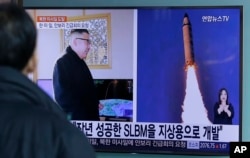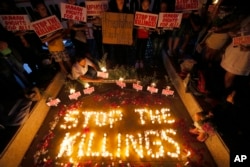The White House on Sunday defended President Donald Trump's invitation to his Philippine counterpart to visit Washington, saying the need to fortify an Asian alliance against North Korea's growing military threat outweighed concerns about President Rodrigo Duterte's deadly domestic crackdown on drug trafficking.
"There is nothing right now facing this country and facing the [Asian] region that is a bigger threat than what is happening in North Korea," said White House chief of staff Reince Priebus in an interview with ABC news. "Whether they're good folks or bad folks - people we wish would do better in their country - doesn't matter. We've got to be on the same page" on North Korea.
Priebus' comments came a day after the White House announced the invitation, and just hours after a Philippine presidential spokesman said Trump told Duterte by phone that he was interested in developing 'a warm, working relationship."
A White House statement called Saturday's call between the two leaders "very friendly." It also described ties as "now heading in a very positive direction."
Duterte crackdown under fire
However, the statement made no mention of the international controversy around Duterte's widely condemned war on drug trafficking - a violent initiative that has drawn the ire of the United Nations and most Western heads of state.
Last year, then-U.N. chief Ban Ki-moon strongly condemned Duterte's support for the extra-judicial killings, calling them "a breach of fundamental human rights and freedoms."
Since taking office last year, analysts say Duterte's drug war has led to more than 6,000 deaths - about one-third of them in police raids and the remaining by vigilantes.
At one point late last year, Duterte boasted to British media that he had personally killed three suspects while he was mayor of the southern city of Davao.
Phone call follows N. Korean missile launch
Saturday's presidential phone call also coincided with another North Korean ballistic missile test north of Pyongyang. U.S. and South Korean analysts say the test failed, with the missile falling, without causing harm, into the Sea of Japan.
Washington has responded to recent North Korean missile activity by ordering the deployment of a sophisticated anti-missile system to ally South Korea. President Trump also has ordered the deployment of a flotilla of warships and at least one nuclear submarine to the region in a show of military force.
Pyongyang conducted two unauthorized nuclear test explosions last year and about two dozen rocket launches in a years-long push to expand its nuclear weapons and ballistic missile programs.
Kim: ICBM testing in ‘final stage’
North Korean leader Kim Jong Un declared in a speech on New Year's Day that his country's program to build intercontinental ballistic missiles had "reached its final stage."
North Korea has been under United Nations sanctions since 2006, along with an international arms embargo aimed at slowing development of its banned nuclear and missile programs.
Since then, Washington and a vast majority of world governments have repeatedly demanded that the North denuclearize the Korean peninsula. However, Western leaders have yet to devise a plan that would either compel the Pyongyang to cooperate or create incentives for it to do so.







